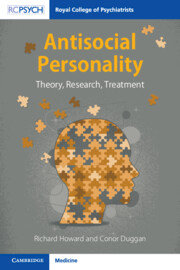‘The authors disaggregate the antisocial personality disorder classification and present a learned and refreshing exploration of the multiple factors that are implicated in antisociality in general. Encompassing biological, psychological, social, and cultural facets, they integrate a wide literature in a fascinating and transformative appraisal. After examining treatment outcome research, they distil their knowledge, wisdom, and experience into sound practical advice for managing and treating people who can be antisocial. Academics, health and social care professionals, legal personnel, and the interested member of the general public would all gain from reading this work. It is a real tour de force.’
Mary McMurran - former Professor of Personality Disorder Research, University of Nottingham, UK
‘This is an exceptional book. It aims at, and achieves, a brilliant integration of population- and person-centred perspectives on this complex mental health problem. Despite the many controversies that surround the construct of ASPD, the book at all times remains balanced and highly practical, filled with deep understanding and sage advice. It is an invaluable guide through a labyrinthine field from two great masters of forensic mental health. It is simply the best book on the subject to date.’
Peter Fonagy - OBE, FMedSci, Head of Division, Psychology and Language Sciences, UCL, and Chief Executive, The Anna Freud National Centre for Children and Families, London, UK
‘The scholarly contributions of Dr Howard and Professor Duggan to the field of personality disorder never cease to amaze. In this book, they eloquently present an innovative framework for conceptualizing antisocial personality disorder, which is underpinned by research evidence and clinical realities. Through the prism of prosocial behaviour, this book takes our understanding of the emotional, motivational, and neurobiological determinants of human antisocial behaviour to new horizons, with some important implications for future research and clinical practice.’
Najat Khalifa - MD, FRCPsych, FRCPC, Queen’s University, Canada
‘Richard Howard and Conor Duggan are to be congratulated for this refreshing evaluation of a thorny subject. Antisocial personality disorder and its mirror twin, psychopathy, are ugly monuments despoiling the psychiatric landscape; we seem unable to do anything to make them more attractive and acceptable, and our attempts at treatment have been lamentable. But Howard and Duggan are not dissuaded. They quietly and systematically dissect the classification, neuroscience, developmental, therapeutic, and epidemiological aspects of the condition, providing valuable insights and commentary. Along the way, they illuminate aspects that we should all recognize, including the unsatisfactory and heterogeneous nature of the word 'psychopathy', the strong evidence that antisociality show its colours most strongly in adolescence (when we should be intervening therapeutically), and that we have been less than bold in the evaluation of our interventions. Those who encounter antisocial behaviour in any aspect of their work could benefit from this very readable and well-set-out book; it has messages for us all.’
Peter Tyrer - Emeritus Professor of Community Psychiatry, Imperial College, London, and Consultant in Transformation Psychiatry, Lincolnshire Partnership NHS Foundation Trust, UK
'This is a valuable book on an important topic by leading scholars with extensive front-line experience working with severely antisocial individuals. Exceptionally well written, it surpasses other available sources in its balanced and complementary coverage of conceptual-empirical and clinical-applied material. Latter chapters on treatment of antisocial behavior and psychopathy are particularly incisive and informative. The book will be of interest to researchers for its up-to-date coverage of diagnostic issues/approaches and causal factors, and to practitioners for its nuanced consideration of prospects and obstacles in providing services to offender populations.'
Christopher J. Patrick - PhD, Distinguished Research Professor of Psychology and Director of Clinical Training, Florida State University, USA
‘… after [reading] this book, clinicians will … better understand the patients they are trying to treat and thus be better able to engage where they are able and feel less frustrated in the areas they are unable to engage. This book would have been helpful in my past engagements with patients with antisocial personality disorder and I hope it will be helpful in my future encounters with this condition.’
Aaron John Plattner
Source: Doody's Reviews



